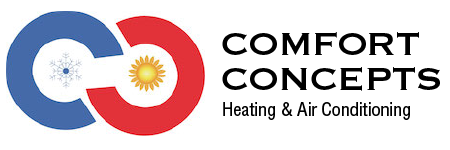
To combat increasing energy expenses and embrace sustainability, many homeowners are trying new methods to maintain comfort levels while using less energy. As part of the Inflation Reduction Act, federal tax credits are available for high efficiency HVAC equipment. These credits offer significant savings, as long as the homeowners use eligible equipment and submit the appropriate form.
If you’re trying to avoid a long process, maybe we can help! Comfort Concepts Heating & Air Conditioning hopes this guide will give you what you need to secure 2024’s HVAC tax credits. Here’s what you’ll need to do.
Understanding the HVAC Tax Credits
These valuable tax credits for upgrading your home to be more energy-efficient are just one intended use of the recent Inflation Reduction Act. Energy costs affect everyone, so helping homeowners upgrade to higher efficiency utilities can benefit everyone. The key provision of these credits is to reduce the cost of installing high efficiency upgrades. Two of note are the Residential Clean Energy Credit and the Energy Efficiency Home Improvement Credit.
But remember, to earn any of the credits, you’ll need a completed IRS Form 5695. Additionally, this form is submitted within the same tax year any upgrades were installed, not bought.
Energy Efficiency Home Improvement Credit
Through 2032, the Energy Efficiency Home Improvement credit empowers homeowners by offsetting up to $3,200 every year for energy-efficient home upgrades. This amounts to 30% of the total project’s cost. Keep in mind that in order to be eligible for the maximum amount, it involves making different investments. For example, you’ll get up to $2,000 for high efficiency heat pump systems. This can be paired with an additional $1,200 in credits for more projects in the tax year.
While heat pumps are a great use of the program, high-efficiency furnaces, air conditioners, boilers, and other HVAC systems are still eligible for this tax credit. It will help to confirm that your choice’s energy efficiency rating is high enough for eligibility.
Exploring the Residential Clean Energy Credit
The Residential Clean Energy Credit amounts to roughly 30% savings on a number of other residential clean energy efficiency projects. Eligibility is restricted to homeowners looking for new clean energy solutions for their home. While the Home Improvement Credit focuses on utilities and HVAC systems, this credit is more about renewable energy sources like solar and wind energy.
Some provisions of the tax credit include requiring the installation project to be finished between 2022 and 2032. But at the same time, homeowners can use any excess credit to reduce taxes in future years. This is a great way to soften the entry into investing in clean energy.
What Else Is Eligible for These Tax Credits?
Because HVAC systems are one of the biggest portions of your monthly energy costs, these tax credits incentivize the most energy-efficient options. But home energy efficiency can be improved in many other ways. Apart from the previously listed HVAC upgrades, {you could also choose|other eligible items include|you also have access to:
- Heat pump water heaters
- Electrical panel upgrades
- New electrical wiring
- Enhancements to insulation, air sealing, and ventilation
- Energy-efficient cooking appliances like stoves, cooktops, and ovens
- Heat pump clothes dryers
- Water boilers
Like the HVAC systems, you’ll need to check that your preferred make and model features the required energy efficiency ratings.
Three Tips for Making the Most of 2024 HVAC Tax Credits
While all the listed upgrades can boost home energy efficiency, a little planning will ensure the best chance at more long-term benefits. Get the most from your HVAC tax credits with these reminders:
- Conduct a home energy audit to identify impactful upgrades. Trust experienced HVAC companies to pinpoint essential products and services.
- Enhance your home's envelope by addressing inefficient windows and doors.
- Look into rebates for clean energy projects from utilities. Renewable sources like solar, wind, and geothermal contribute to community power grid sustainability.
- Don’t forget financing options from local service companies, which can help reduce costs even more.
Comfort Concepts Heating & Air Conditioning Can Help You Secure HVAC Credits for 2024
Partner with local HVAC professionals like Comfort Concepts Heating & Air Conditioning for eligible serves like energy assessments or new installation. Our experienced installers can deliver whatever you need for home energy efficiency upgrades.

